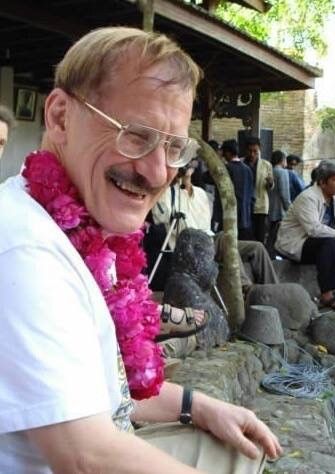 Jack Body (1944-2015)
Jack Body (1944-2015)
“Jack!@80” at St.Andrew’s
(an 80th birthday concert of Jack Body’s music)
Concert organisers: Pepe Becker, Judith Exley, Robert Oliver,
Dan Poynton, Jennifer Shennan, Yono Soekarno
St.Andrew’s-on-The-Terrace Church, Wellington
Saturday, 12th October, 2024
A concert devoted to the work of a single composer by its very nature promises to be a singular occasion no matter where in the world such an event takes place. In the past we in Aotearoa, New Zealand have had a number of concerts to celebrate anniversaries of some of our composers, alive or dead, with Douglas Lilburn and David Farquhar being the first to come to my mind. And certainly many others have produced sufficient volumes of work that would fill out plenty of single-composer concert programmes – so there have probably been other instances of such single-composer events that I simply haven’t heard of.
Anniversaries do provide welcome excuses to “celebrate” a particular composer’s work – and such a chance presented itself this year with the eightieth birthday anniversary of Wellington composer Jack Body, who died in 2015. A group of the city’s prominent musicians and associates set about bringing together various performers who were associated with Jack Body as students, colleagues or simply contemporaries of his, all drawn to the manifold creative energies and significances emanating from his music – strands of influence that were brought together to wondrous and colourful effect last Saturday evening at St.Andrew’s-on-The-Terrace Church in Wellington.
Aptly described in the programme for the event as “a selection of Jack’s smaller-scale solo and ensemble works” the concert nevertheless clearly demonstrated something of the range of his interests and preoccupations as a composer. Especially prominent was evidence of his activities regarding the establishment of cultural links with Indonesia, China, Cambodia, and other places throughout Asia besides his awareness of western traditions of song, dance and literature. Though Jack’s seemingly boundless energies in organising larger-scale events featuring his music were only hinted at here – one thinks of his opera Alley (based on the life of Rewi Alley, and performed at the1998 International Festival of the Arts), the multi-event “Sonic Circuses” of the 1970s, the promotion of Asian music and musicians both here and in various Asia-Pacific Festivals and Conferences of which he was the artistic director, and on numerous other festival occasions often the “featured composer”, in addition to his work as “Composer-in-Residence” with the Auckland Philharmonia in 2012-13 – there was no doubt as to the range and scope of his creative imagination evidenced by the works we heard, even if in some cases the “snippets” from complete works left one wanting to have one’s cake and eat more than a mere tantalising slice or two!
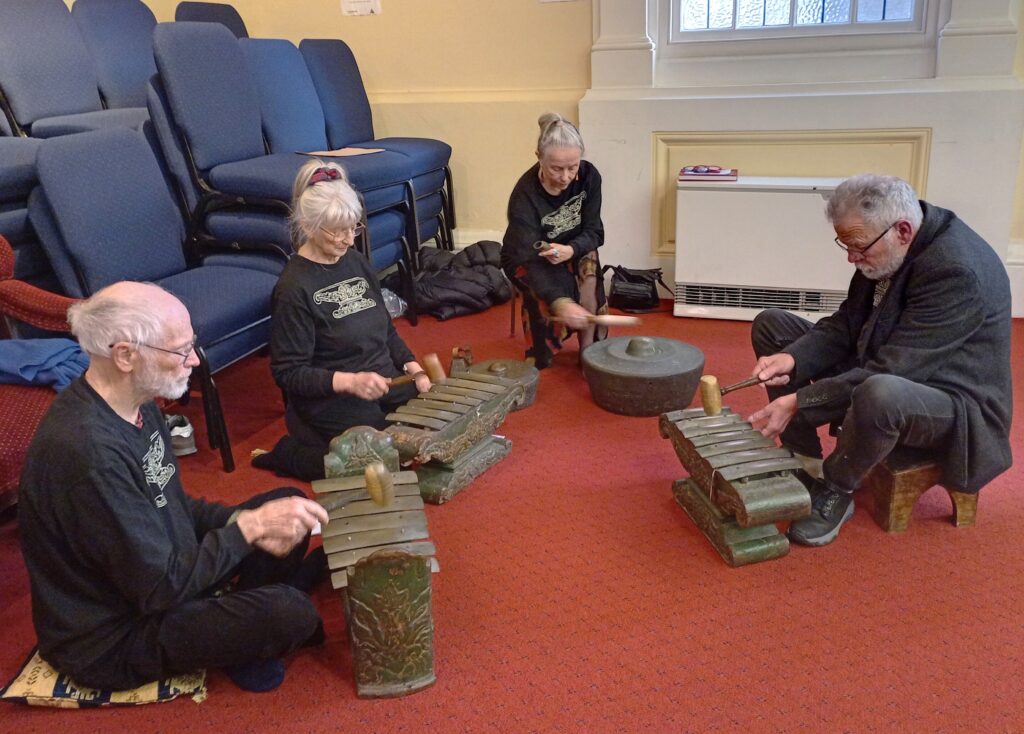
The First Smile Gamelan Group – Jennifer Shennan and Gerard Crewson (right) assisted by Chris Francis and Rosalind Jiko
At the outset prospective concert attendees were charmed upon entering the church by the sounds of a gamelan group of four called The First Smile performing on their instruments at the rear of the church nave, playing pieces composed by two of the actual group members, Gerard Crewdson and Jennifer Shennan, assisted by two others, Chris Francis and Rosalind Jiko. Also, remarkably, as if apropos of the cornucopia of achievement on the part of the concert’s subject about to be presented, each person upon entering and contributing a koha was offered a free copy of “Jack – celebrating Jack Body – Composer” – a gorgeously lavish book which had been published by Steele Roberts in 2015, a collection of tributes and recollections penned by Jack’s many friends, colleagues and contemporaries from over the years, all beautifully appointed and illustrated.
Once inside and all gathered we were welcomed to the concert by Robert Oliver, former director of music at St.Mary of the Angels Church in Wellington, and well-known as an instrumentalist and conductor with a number of ensembles in the capital over the years. In thanking the audience for coming to pay tribute to Jack Body’s memory and legacy, he remarked on the need for the latter’s remarkable qualities and creative achievements to be remembered and given their due and “not to be interr’d with his bones”.
And so began a veritable feast of musical sounds for our pleasure, enjoyment and wonderment, beginning characteristically with the composer’s 2006 work Rainforest, originally for flute and harp, but here adapted for flute and piano. We heard four of the work’s six movements, played by Monica Verburg (flutes) and Dan Poynton (piano), each one preceded by a “field recording” of music performed by the Aka and Ba-Benzele Pygmies of the Central African Republic, and recorded by the French/Israeli ethnomusicologist Simha Arom. The first, Hunting Song, featured some brief vocalisings whose repetitive pattern was elaborated into ostinato from the piano and accompanying decorative flute phrasings. No.3 was the first of two Lullabies, a chant accompanied by percussion, and here developed into a folk-dance-ish pattern, with the flute exploring a “bluesy” counterpoint, the two working up to a jazzy, riff-like response. A second Lullaby sounded like a wordless vocalised meditation, to which the piano and flute responded with what seemed like ecstatic wonderment akin to “loving” exchanges, with the piano reaching downwards as if “earth-breathing” in between each melodic flowering – lovely. The final movement, Children’s Games, brought three singers to the platform with the instrumentalists, reproducing the tape’s brief but racy chanting, with the flutist joining in with the singers’ energetic vocalisings in places while the piano played off-beat syncopations , all to exhilarating effect, and finishing with a flourish as the singers scampered off the stage at the piece’s end!
One of Body’s most-travelled works is the “Five Melodies for Piano”, a work written for and premiered by Margaret Nielsen in Europe (she also recorded the work for Kiwi-Pacific Records). Dan Poynton told us of his introduction to the work while a student of Jack’s, and being given each of the pieces separately to “try” out! Tonight’s version had the added interest of incorporating a solo electric guitar transcription, here played by Gunter Herbig (in what I presumed was his own reworking) of two of the pieces. The piano led off with the well-known opening 3-note repetitive figures, the composer’s “melody within a melody” idea borne out by the performer using the left hand to “mute” some of the played notes, varying the mutes and their intervals and incorporated “extra” notes as the piece proceeds. Gunter Herbig’s guitar took the second and third melodies, the second melody delivered in a breath-holding sequence of beautifully-suspended notes occasionally punctuated by near-toneless “strummings” as the melodic line climbed into its own near-stratospheric space to be swallowed by the silences.
Even more intense was the third piece’s plaintive three-note call with its achingly sharpened second note, the sounds entering their own kind of “nirvana”, the composer inspired by the sound-world of the ancient Chinese zither, Gu Qin, and here transporting our sensibilities most affectingly. Dan Poynton’s piano returned for the fourth melody, beginning with a similarly “lost” figure, the mood then “cleft in twain” by a Saint-Saens-like cock-crow from “Danse Macabre”! The interaction continued, with the cock-crow distended over the keyboard’s whole range! – pulled every which way, hammered, screwed, stretched and flattened, before being allowed to quietly recompose itself and slink away, its “squawk” whimperingly pulled out to a “ninth” in a pathetic gesture of submission! A more seemly envoi came with the final melody (piano again), a gentle ostinato, with notes that established their own patterns before pushing exploratory feelers gradually into different realms, transforming themselves almost effortlessly into impulses which expressed at one and the same time wide-eared amazement and calm acceptance – here, something of a Zen Buddhist attitude when contrasted with the tortured journey of the previous melody.
Exploring a vein of nostalgia can, of course, put one’s sensibilities in touch with unexpected surges of feeling, something which Body felt compelled to explore when recalling his parents’ and grandparents’ fondness for “old songs” – hence his fascinating, almost Brittenesque settings of four such songs, three of which were performed here in different parts of the concert. First up was the ever-popular “Daisy Bell”, performed with suitably sonorous sentiment and gusto by baritone Roger Wilson with pianist Michele Binnie’s sure-fingered accompaniment (we were adjured as an audience to “join in” with the chorus, with what I thought was a creditable response!) – then variously during the concert’s second half we heard another baritone, Chris Berenson (again with Michele Binnie’s piano) in the lesser-known and thus more audience-shy “Sweet Genevieve”, followed later by the hymn-like “All Through The Night” with Pepe Becker’s heavenly soprano and Michele Binnie’s gorgeous piano chordings leading the way through the verses and leaving us to chorus the song’s one-liner refrain!
Back to the first half now for another vocal work, one I’d previously seen performed in full – Body’s 1982 work ”Love Sonnets of Michelangelo”, of which a single one, No.5 “Non posso altra figura immaginarmi” was presented. Originally written for the dancer, Michael Parmenter, and two female voices, this concert version featured Pepe Becker’s soprano with a viola played by Nicholas Hancox taking the lower-voiced part of the duet, an interaction which I found extraordinarily moving, the artist/poet’s words being given “voice” within yet another kind of medium, a different abstraction…..both singer and player brought out the poem’s “ecstasy of despair”, as it were, underlined by the occasional foot-stampings of both musicians and the obsessive quality of the actual notes…..
There followed an electroacoustic work “Musik Dari Jalan” (Music from the Street), a soundscape which drew for its composition from field recordings made in Indonesia by the ethnomusicologist Allan Thomas of the sounds of Jakarta street hawkers. Interestingly, this work won prizes at a major electroacoustic music festival in Bourges France both in the 1970s and 1990s. Further similar interest was garnered by the item which closed the concert’s first half – here, a quartet of string players (Edward Clarkson, Eros Li (violins), Nicholas Hancox (viola) and Jamie Beardslee (‘cello) performed two separate pieces from a 2008 work called “Yunnan”, a collection of transcriptions and arrangements of Chinese minority nationalities in the South-West China province of Yunnan. The first , Bouyi 1, actually NOT from Yunnan (as Body admitted in a performance note) was a kind of “fantasia” for string quartet, the players interacting with the taped singing voices of two Bouyi women, and drawing forth sounds of a particularly haunting quality, with some episodes reminiscent of modal-like passages in English string music by Elgar and Vaughan Williams.
A second piece entitled Bai Sanxian was more dance-like and didn’t appear to feature taped sounds, but simply “live”, dance-like music-making which put one in mind of some kind of exotic-sounding lute, in this case a “sanxian”, its singularities ably suggested by the players.
So much was there to talk about during the interval that it seemed no time at all before we were being refocused upon the platform and the second half’s intriguing beginning – a kind of “Tour of a Neighbourhood” item which emanated from pianist Stephen De Pledge’s commissioning a set of “Landscape Preludes” from New Zealand composers – Body’s characteristically singular contribution to the idea was this 2007 portrait in words and music of his own neighbourhood “The Street Where I live”. Dan Poynton here “teamed up” with the voice of the composer (as pianist Henry Wong Doe had done on the piece’s first recording) to realise the “counterpoint” of speech and its “musical analogue”. Here I thought the voice in places insufficiently projected, with the piano notes occasionally blurring the spoken message; and the abrupt start first time up seemed to leave pianist Dan Poynton in his starting-blocks! – but a re-run righted the balance, and all thereafter was well!
Body’s constantly inventive creative urge brought out many unorthodox touches to his compositions, one of which was the use of “invented language”, vocalising sounds “with no semantic meaning”. His 1989 work “Five Lullabies” was first performed by the Tudor Consort, conducted by its founder, Simon Ravens, and this evening featured three singers, Pepe Becker, Jane McKinley and Andrea Cochrane, from that first performance, here joined by Samuel Berkahn for the second of the two selected lullabies.
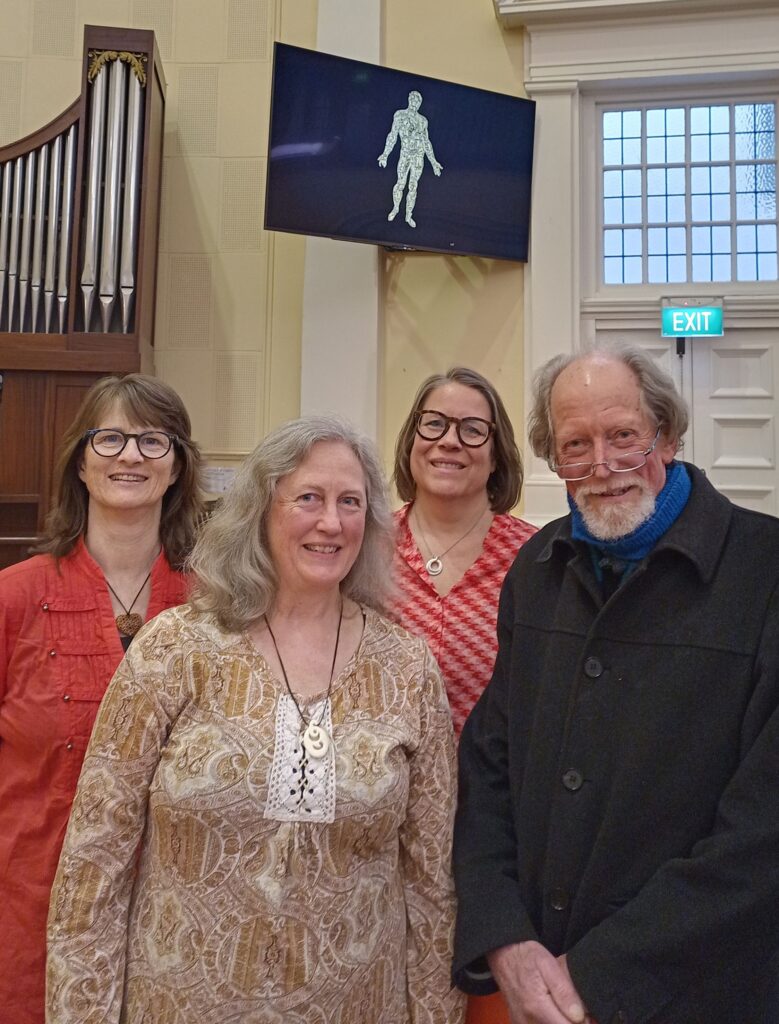 Singers Jane McKinlay, Pepe Becker, and Andrea Cochrane, with Robert Oliver
Singers Jane McKinlay, Pepe Becker, and Andrea Cochrane, with Robert Oliver
The first, No. 3, uses what the composer called the “wonderful vocal polyphonies” of China’s minority cultures, with the so-called “dissonant” interval of a second often held to resonate instead as “consonant” , Pepe Becker and Jane McKinley steadfastedly “holding their lines” with these almost Schoenbergian “more distant” consonances! It was No.5 which worked its magic almost unreservedly for me, however – such hauntingly long and sinuous lines, with Samuel Berkahn’s and Andrea Cochrane’s tones seeming by turns to meld into and drift alongside Pepe Becker’s unswerving lines, the voices’ creating amazing resonances, partly lullabic, and partly lament-like, with the intensities maintained until the cortege of sounds seemed to pass enigmatically into the night.
Yet another glimpse of Body’s seemingly unquenchable search for expression through means that disregard convention was given by pianist Dan Poynton with two excerpts from a work written for and dedicated to him, called “14 Stations”. It’s a title which straightaway suggests to anyone familiar with Christian beliefs a kind of representation of Jesus Christ’s torturous journey towards his crucifixion and death, though Body has proposed the term might as well apply to any journey involving “stations”, such as one by rail. Also, the composer had as well suggested the title might refer to the many different travails undergone by pianists who have to practice at a keyboard for hours each day to “perfect” their art. Certainly each excerpt from this work which Poynton presented here illustrated a specific area of physical effort which, as Body remarked in his programme note subject the body “to stress and discomfort which can extend to physical pain”.
I’d seen one of Dan Poynton’s concert performances of this work not long after the premiere, so was able to relate each of the excerpts’ titles to that memory – each one concentrated on its title’s subject, the first one, “Shoulders” (No.10), moving from an intensely thoughtful aspect to vigorous jabbing motions and a kind of “kneadling” counter-movement, the pianist sighing with the effort at its conclusion. By contrast, “Stiffness” (No.14) presented a hyperactive figure stretching in different directions, percussively beating the instrument’s different surfaces, with moanings and gruntings, then feeling all about both the instrument and his own person to see if there was still life in (a) the instrument and (b) the pianist! We were left hungry for more…..though after such hyperactivity the following 1979 work “Aeolian Harp” resembled a journey from chaos to order, with Nicholas Hancox’s instrument conjuring up harmonic sounds of such unworldliness we felt somewhat disoriented, even “haunted” in ourselves by the readily-imagined passing of air-borne spirits and the resonating earth-echoings left in their wake – stunning!
Such resultant ambiences seemed to spontaneously generate an unprogrammed but entirely apposite item from Dan Poynton on one of the electric keyboards to hand, in bringing to life a precious relic of a bygone age – Jack Body’s own theme music from the television series of what seemed like so many lifetimes hence, “Close to Home”, with the years for a few brief moments peeling off so many listeners’ shoulders (mine among them) like spring blossom from a tree. However redolent for many of us, the composer’s shade was having none of such things as a “farewell”, instead making his “exit” with a somewhat anarchic cocking of a snoot in the face of convention – this was his setting of Auckland writer Russell Haley’s quirky verses which made up “Turtle Time”, a matching of composer and poet whose interaction in itself imbued the piece with singular character.
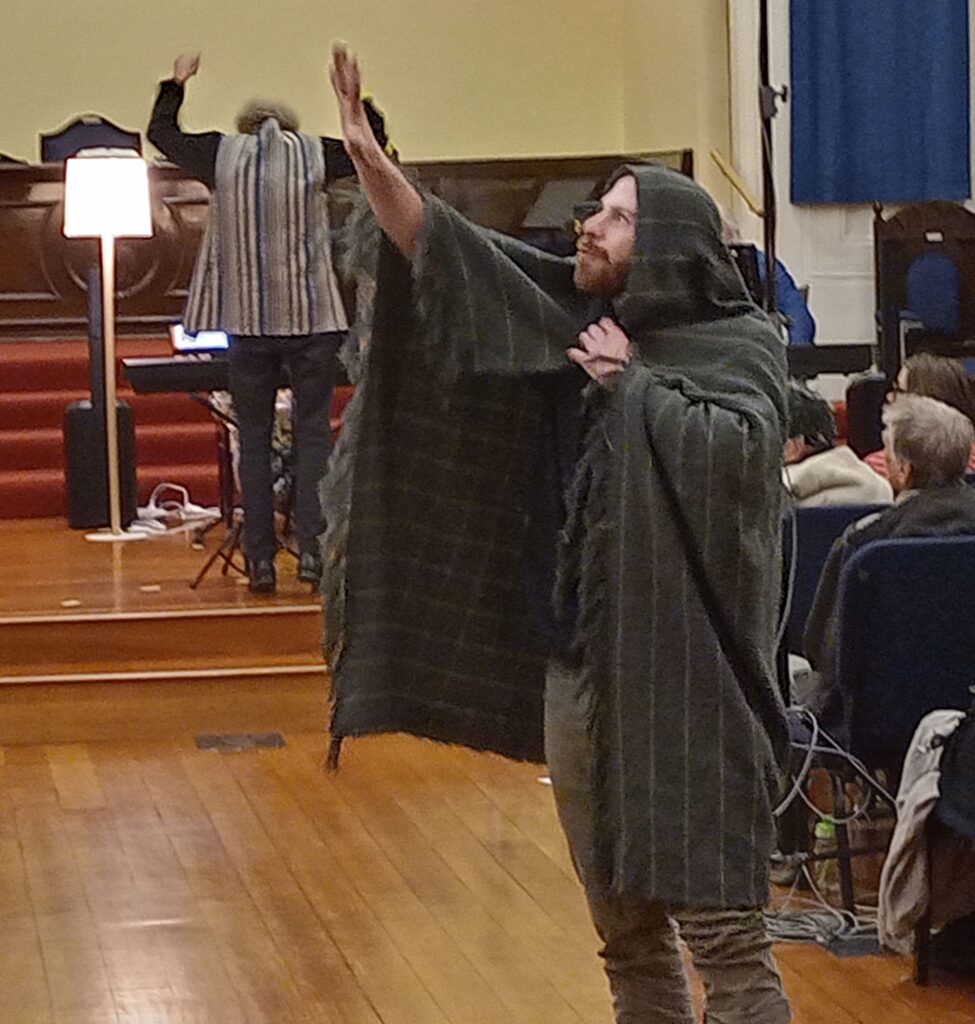 “Turtle Time” with speaker Jonathan O’Drowsky, and conductor Robert Oliver.
“Turtle Time” with speaker Jonathan O’Drowsky, and conductor Robert Oliver.
Poet Ian Wedde vividly characterised Russell Haley’s work in a written tribute after his death in 2016 as “subversive deadpan comic surrealism, where even the most factual and banal components of it, such as the names of people and places, are stretched thinly over layers of alternative reality and identity.” The script of “Turtle Time” revels in such subversions and their separate realities, though this evening’s performance needed, I thought, clearer and perhaps more “Brechtian” poise from its engagingly energetic, if rather too over-excitable speaker/actor Jonathan O’Drowsky, from whose utterances, however zestfully zany, I would have liked a bit more spaciousness and clarity in places (I must add, to be fair, that the St. Andrew’s acoustic has never seemed to me especially kind to ventures featuring the spoken voice sans microphone!). Still, conductor Robert Oliver unfalteringly marshalled his instrumental forces throughout both the trajectories of freely-non-metrical impulse and the spontaneous clusterings of colour and stasis here served up by his expert players, Monica Verburg (harp), Jonathan Berkahn (harpsichord), David Treefrog Sanders (organ) and Dan Poynton (piano).
The concert’s last strains were those of “Auld Lang Syne” in a version very probably wrought by Body himself, and rendered by Dan Poynton on one of the keyboards as a very much “in keeping” gesture. At the end it very much seemed we had spent a most successful evening in the company of a remarkable creative spirit – Jack Body’s is undoubtedly one of those whose legacy will not be forgotten.
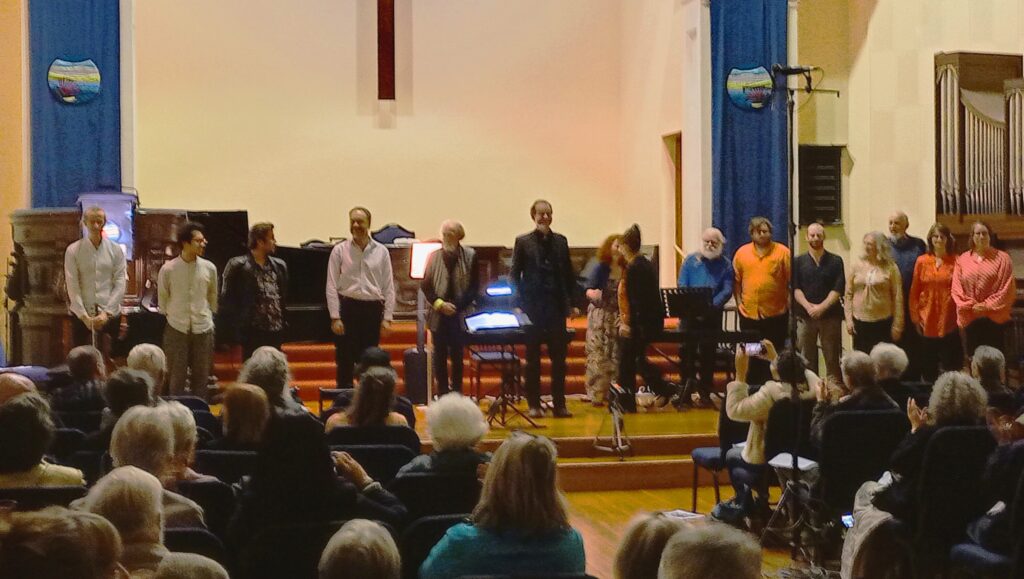 Some of the performers at the conclusion of “Jack@80” at St. Andrew’s-on-The-Terrace Church, Saturday 12th October, 2024
Some of the performers at the conclusion of “Jack@80” at St. Andrew’s-on-The-Terrace Church, Saturday 12th October, 2024